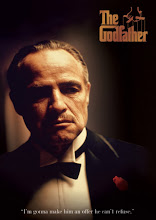Everybody has a favorite actor, or actress. Sometimes it is to do with that specific actors technical skills as an actor, sometimes it is do with their natural charm on screen (i.e. Cary Grant, probably the most naturally charismatic man on screen), sometimes they feel they can relate to the characters which certain actors tend to portray( i.e. Woody Allen) or sometimes people just like an actor for no good no reason.
I guess my admiration of Brando is a mixture of all of the above. I first saw him in The Godfather, in which he played an aging Mafia don who wants to hand over power to one of his sons. Brando played the character beautifully and his performance revitalized his career; however it was the fact that he played Vito Corleone in such a humane way that most appealed to me. Rather than playing him in as a stereotypical evil gangster, he showed that bad people, or people who are perceived to be criminals are not simply “evil”, but are products of their societies, circumstances and upbringing. It was this ability of his to bring out the humane side of his characters that most appeals to me. His portrayal of the idealistic Nazi soldier, Christian Dietsel, in The Young Lions was lambasted by many critics as being an apologia for the terrible crimes which the Nazi’s committed. However such thinking is illogical and somewhat simpleminded-just because a person was a Nazi doesn’t mean that he was evil or that he supported the Holocaust, it merely means that he was a product of his circumstances and times, and that people may be led down the wrong path without consciously realising it. I guess Brando articulated it better when he said “This picture will try to show the Nazism is a matter of mind, not geography, and that there are Nazis— and people of good will— in every country. The world can’t spend its life looking over its shoulder and nursing hatreds. There would be no progress that way.” Everybody is, after all, a product of their culture and of their times, and men who became Nazi’s were no different; they lived in a culture in which violence was institutionalized, anti-Semitism was the norm and poverty was prevalent, they were the product of a culture which had gone through a depression and had been nursing a hatred of other countries since the end of the First World War. The world is never black and white, it is always grey, and I guess that is what Brando wished to demonstrate. Other Western powers have committed holocausts, caused wars and taken over countries all in the name of progress and self-interest, however these were the exact same reasons given by Hitler for his mass extermination of the Jews; just as many American soldiers would rightfully look back on the crimes of Nazi’s with horror they would repeat those crimes in Vietnam and many other countries simply because they were told that what they were doing was “right”.
Brando gave several other brilliant performances, his performance alongside Anthony Quinn in Viva Zapata wass astounding, as were his performances in The Wild One, One Eyed Jacks and Apocalypse Now. However, his three stand out peformances are the ones he gave in A Streetcar Named Desire, Last Tango in Paris and (of course) On the Waterfront. His performance as Stanley Kowalski revolutionised acting-Robert Mitchum and Montgomery Clift may have brought method acting to Hollywood before Brando, but it was Brando’s performance in Streetcar that catapulted method acting to the world stage, and influenced a whole generation of actors. The raw sexuality, the brutality and above all the realism with which he portrayed Stanley Kowalski had never been seen before, it all seemed so real that people often associated Brando with the coarse and vulgar Stanley, even though by his own admission he was nothing like him. Brando’s performance in Streetcarwas probably the most influential performance in the history of film, and for that at least he should be remembered.
His performance as Terry Malloy in On the Waterfront is probably one of the greatest performance of all time. Brando seems to natural in his role as the redemptive mob hand, and his “Contender” scene with Rod Steiger in the back of the taxi cab has gone down as one of the greatest movie scenes of all time. What makes it even more great is that two of the best scenes from the movie, the taxi cab scene and the dropped glove scene for were both improvised (the taxi-cab scene at least partially improvised) and both scenes are a testament to his genius.
Last Tango in Paris, in which he plays a middle-aged man going through an identity crisis was his most “personal” performance, and in many ways his most brilliant. By the end of the film you begin to really feel for Paul as a human being, and as I have already mentioned it was this humane side of Brando which I most admire of him; he did not play cardboard cutouts, he played human beings, and that is I guess (for me at least) what movies are all about.
Do you think Mr Obama deserved the Nobel Peace Prize?
The GodFather Video
iPhone / iPhone 3G / iPhone 3Gs Stereo Handsfree Headset EarPhones HeadPhones
Wednesday, September 30, 2009
Subscribe to:
Post Comments (Atom)





No comments:
Post a Comment